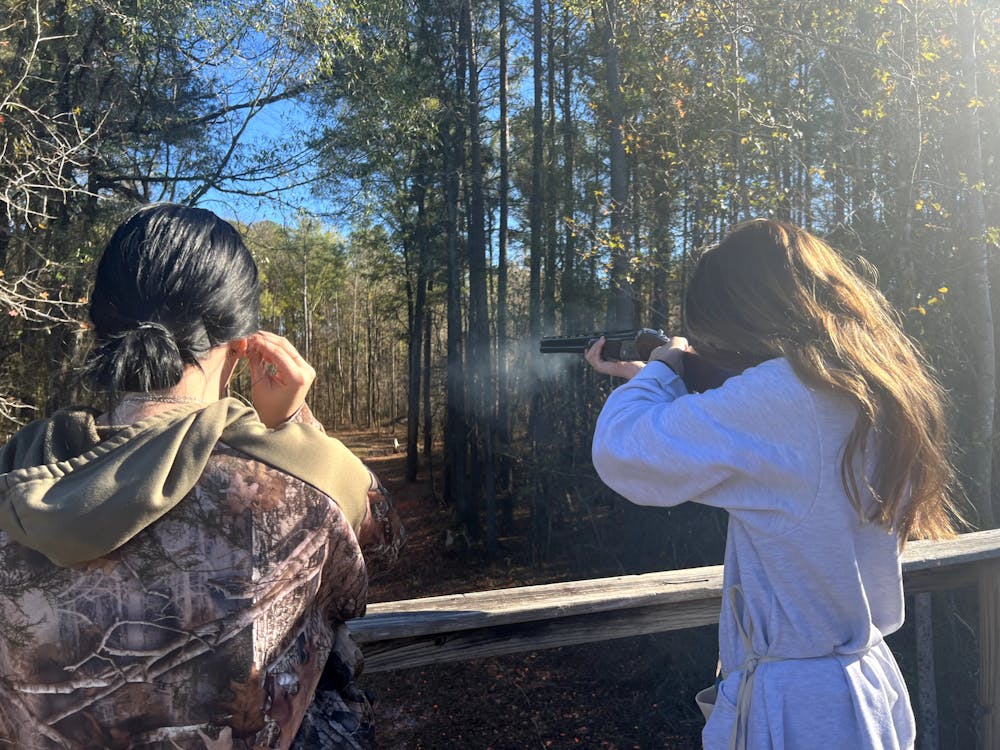It was a brisk November day, and the Deep River Sporting Clays and Shooting School stood out against a backdrop of fall leaves and farmland. Fourteen Duke students had traveled over 40 minutes to the shooting range, some with personal rifles in tow. One by one, the students took aim at clay targets. The sound of the gunfire pierced through the forest silence, accompanied by the students’ soft chatter. Some students gave each other pointers on shooting technique; others reminisced about their hunting clubs at home. One remarked that he had finally gotten out of the “Duke bubble.”
The trip was organized by the Duke Hunting and Conservation Club, a new student organization that received DSG approval this spring. DHCC seeks to “create a space for undergraduate students who are passionate about hunting and its role in environmental conservation.”
In its first semester of operation, the club has seven officers and 71 official members, about half of which regularly attend meetings and events. The members hail from all over the country, and a significant amount are international students.
DHCC was founded by juniors David Gust and Sara Be during the spring of their sophomore year. Both are experienced hunters who felt that they lacked an outlet for their sport at Duke.
“We found that we had no community at Duke for hunting, or even a more outdoor environment-oriented community, so we felt it’d be a good idea to create that community at Duke for other people,” Gust said. “And we found that there are many other people who felt the way we did.”
Gust and Be also wanted to educate students on environmental conservation and its connection to ethical hunting.
“We just saw that there was a little bit of a gap in knowledge and education about hunting especially, and the effect that hunting has on the population and the environment,” Be said.
Gust said that in his home state of Illinois, a portion of government revenue from hunting permits goes to conservation efforts. With fewer young people hunting, Illinois has been forced to cut back on such efforts.
Since its inception in late April 2022, the club has held recruitment events like barbecues with the Duke Fishing Club and has ventured to the nearest gun range.
Their most recent event took over a dozen students, including two graduate students, to the Deep River Sporting Clays and Shooting School in Sanford, North Carolina. As the students entered the facility, they were provided with ammunition, a rifle and a pouch for storage.
Students gathered around an instructor to learn safety rules and procedure that they would be asked to follow during their day at the shooting school. Then they were off to the first round. Each student fired four shots per station, aiming to hit the clay disks soaring past their field of vision.
First-year Otto Laine, an international student from Finland, described himself as a “pretty active hunter.”
“Like the hunting and conservation club here, hunting clubs back home are very in tune with conservation at the same time,” Laine said.
Richard Zhang, a graduate student in the Nicholas School of the Environment, is an international student from China.
“I got my firearm license my junior year of undergrad and I started hunting seriously the first year of my master’s degree,” Zhang said.
When asked about his motivations behind procuring a license and beginning to hunt, Zhang said one of his undergraduate professors said “the best way to know about wildlife management is to become the hunter.”
“You actually walk into the field and then you have to learn about the regulations, how they manage the wildlife balance and populations,” he said.
The event marked the second time that DHHC has ventured to Deep River Shooting Clays and Shooting School. But getting to this point hasn’t been an easy feat as Be and Gust ran into roadblocks while creating the club.
One of those included getting funding for gun rentals and ammunition, Be said. Duke told the group they would not fund any of those purchases. So far, DHCC has overcome this issue with the help of larger hunting and conservation organizations that members of the club had previously interacted with or belonged to in their home states.
“We got the funding we needed, and more,” Be said.
Gust and Be hope to continue conservation efforts and to “get involved with the Nicholas School of Environment, to maybe bring in a speaker that’s closer to the Duke community.”
They hope the club will see more events and sessions for “people who may not be interested in hunting or may not be interested yet, but are really open to learning about gun safety,” Gust said. “Because I think that’s something that everybody should know.”
Get The Chronicle straight to your inbox
Signup for our weekly newsletter. Cancel at any time.

Audrey Patterson is a Trinity sophomore and local and national news editor of The Chronicle's 119th volume.
Mia Penner is a Trinity junior and an audience engagement chair of The Chronicle's 120th volume.

